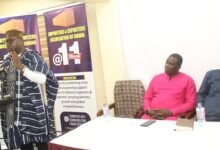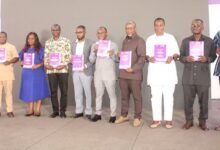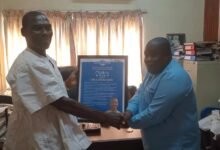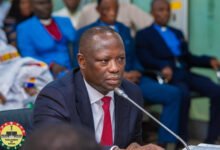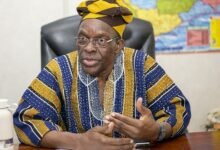
When Dr Kwame Nkrumah, Ghana’s first president, made his famous declaration that “Ghana, our beloved country is free forever,” he was only putting the icing on the cake of Ghana’s independence, the Speaker of Parliament, Professor Aaron Mike Oquaye has stated.
“There were other bakers of the cake. Can you forget them? No. Our independence was gained more with brain than with brawn. This must be acknowledged,” Prof Oquaye, a former head of the Political Science Department of the University of Ghana, said at a lecture in Accra yesterday to mark Founders’ Day celebration.
The lecture, introduced last year, brought together government officials, traditional and religious leaders, some politicians, academics and representatives of various stakeholders.
There has been a debate over whether or not Nkrumah should be credited with founding Ghana or not. The debate, mostly between the Nkrumahist and the Danquah-Busia political traditions, culminated into the passage of the Public Holiday Amendment Act in 2019 recognising all other contributors in the independence struggle.
“Nkrumah was a great leader. He was one of the founding fathers, but never the founder of our nation. No matter how great Paul was, he cannot be the founder of Christianity, to the exclusion of Peter, James, John and others.
“Ghanaians must know exactly where we are coming from, so that the past should be a guide to the present and the future. We should give credit to our forebears who signed the Bond of 1844 on March 6, 1844, for example.
“They established a contractual relationship between the Gold Coast and the British. Soon after 1944, our leaders could demand; ‘White man, time is up. Go home!’ This is what Paa Grant, Danquah and others did,” Professor Oquaye said.
It was important that August 4, 1947, when the United Gold Coast Convention (UGCC) was inaugurated in Saltpond, at a time Nkrumah was not in the country, is recognised as the day Ghana’s ultimate independence movement begun, Prof Oquaye said.
Kwame Nkrumah, the Speaker of Parliament said, added bountifully when he was brought from the US to serve as the administrator of the UGCC in January 1948; admitting that “Nkrumah was a great man.”
Speaker Oquaye continued: “He was not in Ghana when it all started. Nkrumah was not the founder! Danquah conceived the idea of calling the independent Gold Coast, Ghana. This was formally adopted in Saltpond. It became known to every school child then that our nation would soon become independent; that our leaders were fighting for this, and the name of the new nation would be Ghana.”
A whole host of heroes, Prof Oquaye recounted, contributed to what culminated in independence in 1957 revealing that “after the 1948 Riots, it was J.B Danquah who sent that famous Cable to the Secretary of State for the Colonies, saying the colonial administration had collapsed.
“He made specific demands as leader of the independence movement. He asked for the recall of the Governor. Danquah called for an interim government run by the UGCC. He proclaimed a Constituent Assembly to draw a new Constitution for self-government.”
Before Dr Kwame Nkrumah set sail to the then Gold Coast, Prof. Oquaye said “the founding fathers” had already chosen the eagle asthe national emblem and the national colours- red, yellow and green- discussed at length and accepted.
“A recap of the chronology of events shows that before the arrival of Nkrumah, some gallant men were taking steps to lead Ghana to independence. If something had not been founded, what was Nkrumah brought down for? If there was nothing, what was he to come and help to consolidate?” he asked.
“Nkrumah did not alone compose the classical sonata and constitute the orchestra which sang Ghana’s clarion call to independence in sweet melody, all in two months! The fathers of the nation were there already. They included Paa Grant, J.B. Danquah, Akufo-Addo, AkoAdjei, Obetsebi Lamptey and William Ofori-Atta,” the political historian emphasized.
“It needs to be emphasised – something existed before Nkrumah was invited to come and help. How can the helper alone become the sole founder? Nkrumah was great. He played a big part in the struggle for independence. He may be honoured with a holiday. But it cannot be Founder’s Day. Why? Because he was not the founder of our dear nation,” he stressed.


